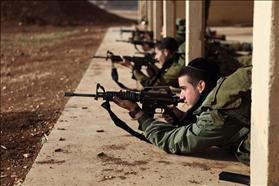A war with deep convictions
Religion's pervasive role in Operation Protective Edge
Operation Protective Edge was accompanied by several occurences that signify opportunities for progress as well as serious challenges that must be addressed.
11/08/2014 14:50
Tags: IDF · Operation Protective Edge · equality in sharing the burden · shas · Rabbi Shalom Cohen · Aryeh Deri

Haredi Netzah Yehuda Battalion soldiers at a firing range. 24.2.2012. Photograph: Nahumi Ya'akov, Flash 90.
The war in Gaza provided us with unique insights into some of the dominant trends within the haredi community. There have been several occurrences over the past several weeks that signify opportunities for progress as well as serious challenges that must be addressed.
On the encouraging side, there were significant numbers of Haredi individuals and communities who contributed to the social cohesion surrounding Operation Protective Edge. Many felt motivated to pray, study Torah (partially cancelling days of summer break), and offer spiritual support to the soldiers. Many drove to the South to visit and encourage soldiers waiting to enter the Gaza Strip throughout the Operation. The support came through a wide variety of avenues: hot food, coffee stands, ritual tzitzit garments, and Hasidic Techno dance parties to raise morale.
These activities were reportedly accompanied by a change in attitude among some haredi students regarding army enlistment. The Times of Israel interviewed several individuals in the Haredi sector who spoke about efforts to organize haredi students to enlist in the army in light of the Operation. Hiddush Vice President Shahar Ilan recently spoke with TLV1 Radio and affirmed the notion that we could be witness to a rise, albeit not widespread, in enlistment from the ultra-Orthodox sector of Israeli society.
Worrisome statements from leading rabbis
On the other hand, there were several incidents that indicate continued opposition to haredi IDF enlistment, as well as outright contempt for the necessity of a standing army for Israel's defense.
Rabbi Yisroel Yitzchak Kalmanowitz, a highly-respected rabbinic authority in the Lithuanian haredi community, offered one of the most disturbing statements, publicly wondering if one should pray for the success and safety of our soldiers and whether secular soldiers might be better off dead and recognized as martyrs rather than lead a life full of religious punishment for their heretical lifestyles.
Rabbi Shalom Cohen, the successor to Rabbi Ovadia Yosef as spiritual leader of the ultra-Orthodox Sephardic party, Shas, fiercely demonstrated his stance regarding the army, claiming that, "Israel does not need an army," and that "it is God almighty who fights for Israel.
Shas Chairman MK Rabbi Aryeh Deri reiterated the mainstream haredi view towards the Army. In an interview with the Army Radio Station, MK Deri responded to the challenge of recruiting yeshiva students, stating that there a division
Hiddush spoke out strongly against these statements and continued to support and advocate for unity behind the Israeli Army and the need for Haredi enlistment during those challenging weeks
of labor in Israel, where haredi yeshiva students contribute their share to Israel's security by generating divine miracles through their study and prayers. He asserted that Egyptian General Sisi's presidency, Hezbollah's absence from the operation, and the relatively low number of Israeli causalities as some examples of the divine overt miracles, thanks to yeshiva students' contribution to Israel’s security.
Hiddush spoke out strongly against these statements and continued to support and advocate for unity behind the Israeli Army and the need for Haredi enlistment during those challenging weeks.
Mitzvah Tanks on the Front Line?
Chabad-Lubavitch, a Hasidic movement active in Israel and abroad, was very vocal and visible during the war, mixing religion with politics. They visited the troops and encouraged soldiers to lay tefilin, sing and dance. They ran social media and public ad campaigns quoting the late Lubavitcher Rebbe, Rabbi Menachem Mendel Schneerson, who spoke out against stopping battles in the middle during the First Lebanon War in 1982. The campaign emphasized the movement's religious message regarding Operation Protective Edge: Continue the military operation in Gaza until the complete demise of Hamas. Anything short of that is like a surgeon stopping an operation in the middle.
Other huge billboards urged Israelis to attach a Mezuzah to one's home doorposts (and check the condition of existing mezuzah scrolls) and for men to lay tefillin (“Laying Tefilin will cast fear on the enemy”) as the means to best defend Israel during times of war.
Far be it for us to suggest that these Jewish practices are not worthwhile, but it would have been helpful if Chabad added to these ritual appeals and preaching the continued military operation also an appeal to their disciples and to the Haredi community regarding the obligation to enlist and share in the actual military burden. It is not a coincidence that such an appeal was not heard, as already in the past Chabad rabbinic leadership issued strong admonitions against recruiting yeshiva students into the army.
Clearly, even in times of war, the unholy alliance between religion and politics plays a decisive and often damaging role to Israel's Jewish and democratic character. Hiddush wholeheartedly values the need for national unity during Israel's difficult times, but we must continue to address the challenges and work towards the goal of freedom of religion in Israel.